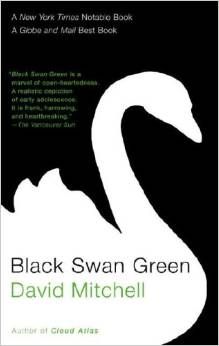Who doesn’t revere the fiction of David Mitchell? His linguistic exuberance, deft juggling of multiple stories (six interlocking tales in Cloud Atlas) and the originality of the worlds he invents cannot fail to astonish readers, as if we are being rocked out of some formula fiction stupor. In an interview with Mitchell in The Paris Review, his work was described as “ambitious, formally complex, imaginatively powerful, and immaculately written.” The interviewer noted that Mitchell’s novels “zigzag across the globe, across centuries, skipping from genre to genre with a restless, openhearted intelligence.” Accolades for the fiction of this British born author abound. Just recently his latest novel, The Bone Clocks, was reviewed in The New York Times Sunday Book Review. The reviewer called Mitchell a novelist “who’s always close to the soil and orbiting the heavens in the same breath.”
All true. But that’s not why I revere David Mitchell.
 My high regard for him rests on one of his less experimental novels, Black Swan Green, published in 2006. It’s a coming of age story that is written in the single narrative voice of a thirteen year old boy, Jason Taylor. “Old school,” Mitchell calls the book. He wanted to see if he could write a compelling novel about an outwardly unremarkable boy, who, as it happens, is a thinly disguised stand-in for the author. But neither Jason Taylor nor David Mitchell himself can pass for ordinary, not by the farthest stretch of the imagination. For starters, both have a verbal disfluency. They stammer.
My high regard for him rests on one of his less experimental novels, Black Swan Green, published in 2006. It’s a coming of age story that is written in the single narrative voice of a thirteen year old boy, Jason Taylor. “Old school,” Mitchell calls the book. He wanted to see if he could write a compelling novel about an outwardly unremarkable boy, who, as it happens, is a thinly disguised stand-in for the author. But neither Jason Taylor nor David Mitchell himself can pass for ordinary, not by the farthest stretch of the imagination. For starters, both have a verbal disfluency. They stammer.
In Black Swan Green, Mitchell gives voice to the stammering boy he once was. As Jason Taylor explains in the novel, a stammer is “where you get stuck straight after the first bit of the word.” The words causing him the most grief — the words he is desperate to avoid — begin with N and S. Consequently, a whole lot of words are off-limits when he speaks, given that the S section of any dictionary is the thickest. “I can feel the stuff I don’t say rotting inside me like mildew spuds in a sack,” Taylor says, retreating into near silence. Out of necessity, he becomes adept at thinking one sentence ahead, substituting words to outwit his stammer. He even names his stammer Hangman and describes Hangman’s “snaky fingers that sink inside my tongue and squeeze my windpipe so nothing’ll work.”
Jason Taylor is clearly one frustrated kid who feels freakish and alone or as he puts it, “a brick of loneliness is reaching terminal velocity inside me.” It doesn’t take much to imagine that the thirteen year old Mitchell was already showing signs of being a gifted writer. Little wonder that his fictional persona, Jason Taylor, cherishes his Silver Reed manual typewriter more than his other possessions. It enables him to write poems which he submits to the parish magazine under the pseudonym Eliot Bolivar.
Although Black Swan Green will probably not be hailed as one of Mitchell’s greatest works, writing this story —his story — was a personal triumph. In The Paris Review, he comments that for most of his life, the subject of stammering was “a source of paralyzing shame, scrupulously avoided by family and friends.” After writing the second chapter of Black Swan Green focusing exclusively on stammering, Mitchell says he felt liberated, like a gay man must feel when he comes out. He didn’t have to pretend anymore. And in that chapter he confronts the questions that any kid with a disfluency would ask: Is stammering “like zits that you grow out of” or are kids who stammer more like toys that are “wired wrong at the factory and stay busted all their lives?” In the novel, Taylor’s speech therapist provides the answer. She tells him that progress doesn’t come by trying to kill a speech defect, but rather by respecting, not fearing it. “It will flare up from time to time,” she says. “But if you know why it flares, you’ll know how to douse what makes it flare up.” In becoming a magnificent novelist, David Mitchell found a way to douse the flames of his Hangman by turning the childhood experience of stammering into literature.